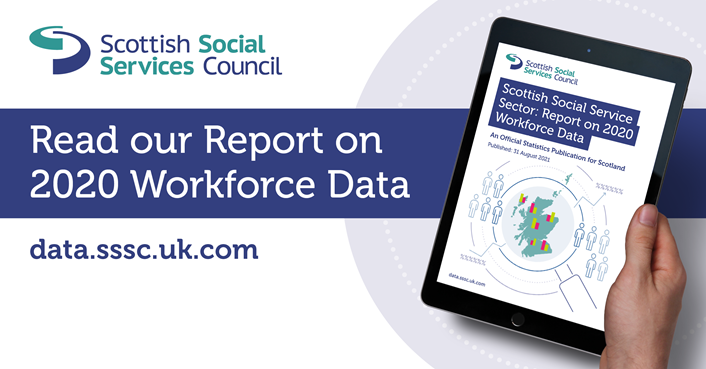The report, published by the Scottish Social Services Council (SSSC), shows the sector makes up approximately 8% of all Scottish employment or one in 13 jobs.
The Scottish Social Service Sector: Report on 2020 Workforce Data highlights the size and importance of the social work, social care and early years workforce, which has played such a vital role during the COVID-19 pandemic.
Lorraine Gray, SSSC Chief Executive said: ‘Over the past 18 months the social work, social care and early years workforce have played a key role in helping the country through the COVID-19 pandemic and meeting the many challenges we faced.
‘The increased size of the workforce demonstrates just how important this sector is, not just for people receiving care and support, but all of society in providing jobs, rewarding careers, training and qualifications and making a significant economic contribution.
‘Our social work, social care and early years workforce bring the right values to their work, are skilled and knowledgeable, making sure care is provided in a way that meets individual needs. The report also shows this is a committed workforce with 80% of workers in the same post as the previous year.
‘While the report shows growth in the workforce last year, it doesn’t show us yet the impact of Brexit or the pandemic, something that will need to be closely monitored and that we expect to start to see in the data for 2021.
‘The biggest increases in workers were housing support and care at home, with more people receiving care in their homes. While in the public sector the biggest increase was day care of children, where recruitment is taking place to meet the expansion of free early learning and childcare.
‘The Scottish Government’s National Care Service consultation offers the opportunity to appropriately value the social work and social care workforce by improving their pay, terms and conditions. We look forward to supporting the workforce through whatever changes are to come.’
Key points from this year’s workforce data report
- The size of the workforce has increased to 209,690, a rise of 1.6% since 2019. This is the highest level recorded since these reports began. The social service workforce makes up approximately 8.0% of all Scottish employment.
- This increase has been driven mainly by increases to the housing support/care at home sub-sector, although in the public sector it was in day care of children.
- The whole time equivalent (WTE) measure of the workforce is 159,260, an increase of 2.6% since 2019.
- The stability index of the workforce is 80.8%. This means just over four fifths of the workforce remained in the same post since last year.
- The largest employer type differs between local authority areas, with services in Orkney, Shetland and Na h-Eileanan Siar (the three island authorities) provided mainly by the public sector. However, in most areas the private sector is the largest employer.
- The three largest sub-sectors are housing support/care at home, care homes for adults and day care of children; together these account for almost 79% of the workforce.
- The median age of the workforce is highest in the public sector (47) and lowest in the private sector (40). Staff working in early years services in the private sector have the lowest median age (29).
- The percentage of men working in the sector is 15%, although it is around double or greater that proportion in criminal justice and residential children’s services.
- The workforce is mainly employed on permanent contracts (83%).
- The median figure for the typical weekly hours worked by staff is 32.5 and 52% of the workforce work full time (more than 30 hours per week).
The report combines administrative data collected by the Care Inspectorate with data collected by the SSSC directly from local authorities to form a comprehensive picture of the paid workforce employed in the social service sector in Scotland at the end of 2020. The SSSC is an official statistics provider.
Read the Scottish Social Service Sector: Report on 2020 Workforce Data here.
